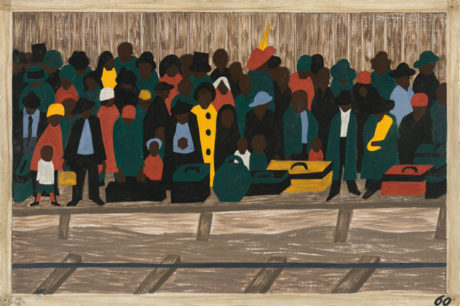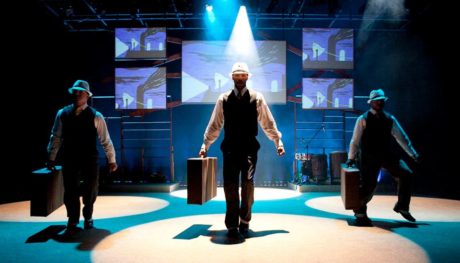There’s a pulse, a simple rhythm. It is both complex syncopation that rushes on, and an inviting and relaxed embrace of the moment. The percussive energy of StepAfrika!, a professional company dedicated to the tradition of stepping, founded by C. Brian Williams, makes the heart beats faster and sharpens the focus. The Migration: Reflection on Jacob Lawrence reminds of an unsettled history, the importance of community, the persistence of relocation and the lack of choice that urges.
The Great Migration of African-Americans from the rural south to cities in the north, Midwest and West, 1900 – 1920, is the subject of 60 images by painter Jacob Lawrence for his Migration Series created during the 1940’s. StepAfrika! honors these masterworks by incorporating selected paintings and pairing them with sequences of movement and live performance that heighten and respond to the detail.

Lighting/Projection Designer John D. Alexander uses five screens simultaneously, both isolating and making bold fragments of Lawrence’s images that tie the performers to the art work. In “The Deacon’s Dance” interpreted by Baakari Wilder and Charise Pinkston each is isolated in a pool of light while a hangman’s noose in spare detail suggests the force of the hardship.
Later in “Trane Suite” beams of light signal an oncoming train, or isolate a solo saxophonist in the smoky atmosphere of a jazz club. The Scenic Design by Harlen Penn suggests changing locations through open spaces that highlight background and foreground, reveal solid texture, or seemingly dissolve.

The sounds of dancers bodies is an emotional supercharge. Hand claps, foot stomping and other percussive uses of the body are intricately syncopated with South African Gumboot and tap dancing furthering a complexity that resonates. The movement is where the sound originates and director Jakari Sherman has brought volumes of sophistication, speed, and technical performance that is precisely brilliant.
“Wade Suite” features Washington Performing Arts’ Men & Women Gospel Choir performing the African-American spiritual “Wade in the Water.” The dancers exclaim and praise with arms held high, or nurture with embraces underlining the importance of the church in giving a unified voice to those forced to leave behind home and country.
“Drum Call” composed and arranged by Director Jakari Sherman recalls the drum as essential to the African village, a method of communicating with neighboring villages or in this case a challenge to the audience to join in the call and response.
“Drumfolk” choreographed by David Pleasant, recalls the harsh conditions of the South. The strength of the ensemble is reflected in quickly changing patterns, repetitions that vary with undulating spines, released and ecstatic arms, and postures close to the earth that launch in the air.
Costumes by Kenann Quander define each historical era with unified muted tones or a varied palette of color that connects to the projections of Lawrence’s images overhead. In “Off the Trane,” choreographed by Jakari Sherman, three male dancers are simultaneously passengers, observers, and the train itself. With suitcases in hand, the dancers charge through the space picking up speed, resettling in lines reminiscent of train car seating, revolving like a wheel, or precisely upsetting the luggage for a better view.
“Chicago” bursts with the hum of city streets, dancers freely exchanging vocal patter and the call and response of rushing forward and retreating back. The communication through body and voice is a celebration of the everyday, a hopeful message about the discovery of a whole new life after a challenging journey from the South to the Northern and Western cities of the United States.
StepAfrika!’s The Migration: Reflections on Jacob Lawrence traces traditions of African-American cultural heritage. It connects with today’s stories of migration while it examines the past, framing and informing through emotion and movement, and cultivating the essence of generosity with much to be shared and exchanged with new arrivals and for future generations.
The production features dazzling performers including Mfoniso Akpan, Makeda Abraham, Christopher Brient, Dionne Eleby, Delaunce Jackson, Joe Murchison, Anesia Sandifer, Jakari Sherman, Brittny Smith, Jordan Sry, Ta’quez Whitted with Special Guests Jabari Exum, Lionel D Lyles II, Charise Pinkston, and Baakari Wilder.
Running Time: 90 minutes, with one 15-minute intermission.
StepAfrika!’s The Migration: Reflections on Jacob Lawrence performs through tomorrow, October 2, 2016 at University of the District of Columbia’s Theater of the Arts – 4200 Connecticut Avenue NW, in Washington, DC. For tickets, call Washington Performing Arts (202) 785-9727 or purchase tickets online, or at the door.
RATING:




